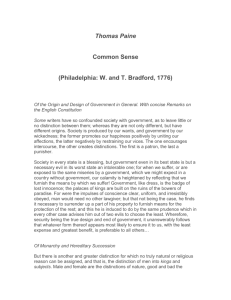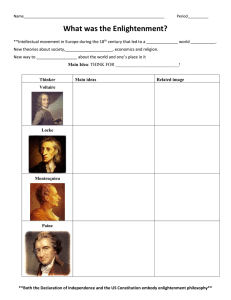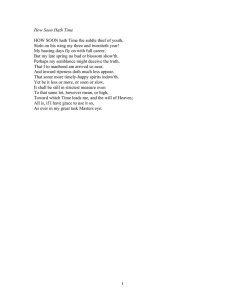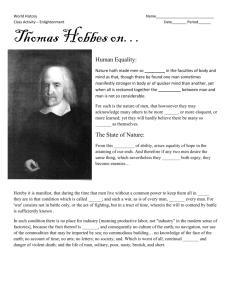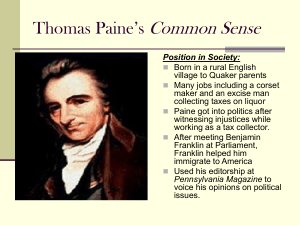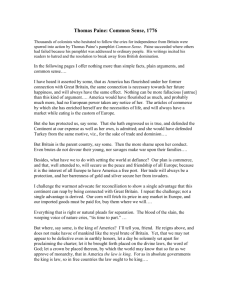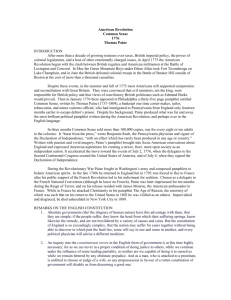Readings Package – American Revolution
advertisement
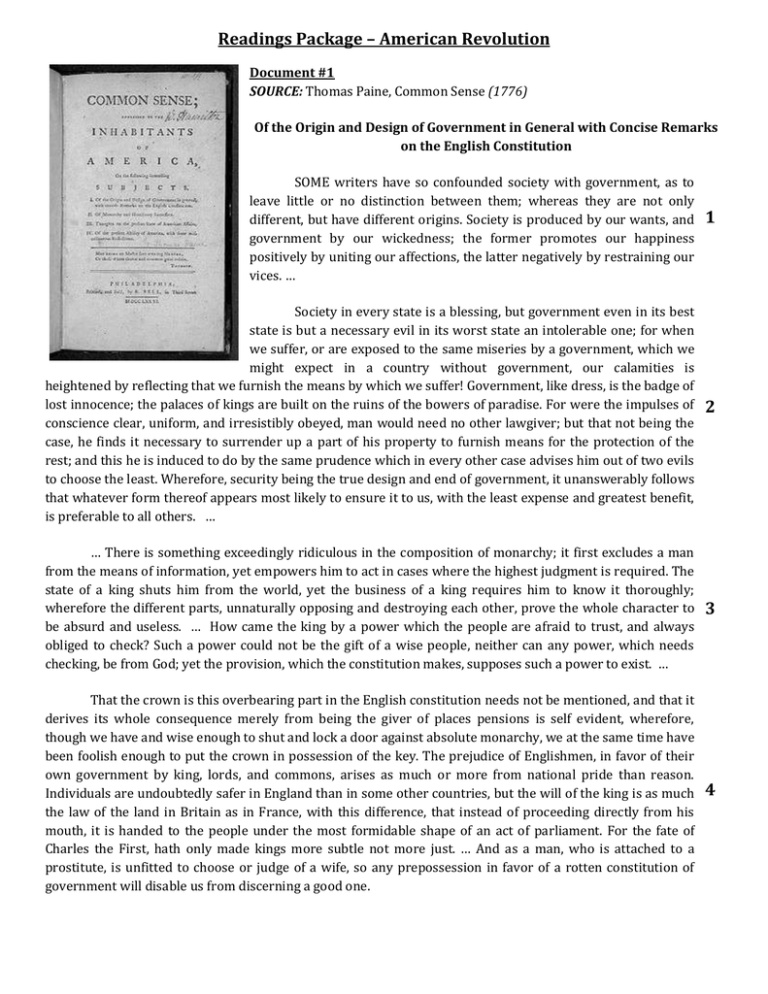
Readings Package – American Revolution Document #1 SOURCE: Thomas Paine, Common Sense (1776) Of the Origin and Design of Government in General with Concise Remarks on the English Constitution SOME writers have so confounded society with government, as to leave little or no distinction between them; whereas they are not only different, but have different origins. Society is produced by our wants, and government by our wickedness; the former promotes our happiness positively by uniting our affections, the latter negatively by restraining our vices. … Society in every state is a blessing, but government even in its best state is but a necessary evil in its worst state an intolerable one; for when we suffer, or are exposed to the same miseries by a government, which we might expect in a country without government, our calamities is heightened by reflecting that we furnish the means by which we suffer! Government, like dress, is the badge of lost innocence; the palaces of kings are built on the ruins of the bowers of paradise. For were the impulses of conscience clear, uniform, and irresistibly obeyed, man would need no other lawgiver; but that not being the case, he finds it necessary to surrender up a part of his property to furnish means for the protection of the rest; and this he is induced to do by the same prudence which in every other case advises him out of two evils to choose the least. Wherefore, security being the true design and end of government, it unanswerably follows that whatever form thereof appears most likely to ensure it to us, with the least expense and greatest benefit, is preferable to all others. … 1 2 … There is something exceedingly ridiculous in the composition of monarchy; it first excludes a man from the means of information, yet empowers him to act in cases where the highest judgment is required. The state of a king shuts him from the world, yet the business of a king requires him to know it thoroughly; wherefore the different parts, unnaturally opposing and destroying each other, prove the whole character to be absurd and useless. … How came the king by a power which the people are afraid to trust, and always obliged to check? Such a power could not be the gift of a wise people, neither can any power, which needs checking, be from God; yet the provision, which the constitution makes, supposes such a power to exist. … 3 That the crown is this overbearing part in the English constitution needs not be mentioned, and that it derives its whole consequence merely from being the giver of places pensions is self evident, wherefore, though we have and wise enough to shut and lock a door against absolute monarchy, we at the same time have been foolish enough to put the crown in possession of the key. The prejudice of Englishmen, in favor of their own government by king, lords, and commons, arises as much or more from national pride than reason. Individuals are undoubtedly safer in England than in some other countries, but the will of the king is as much the law of the land in Britain as in France, with this difference, that instead of proceeding directly from his mouth, it is handed to the people under the most formidable shape of an act of parliament. For the fate of Charles the First, hath only made kings more subtle not more just. … And as a man, who is attached to a prostitute, is unfitted to choose or judge of a wife, so any prepossession in favor of a rotten constitution of government will disable us from discerning a good one. 4 Of Monarchy and Hereditary Succession … But there is another and greater distinction for which no truly natural or religious reason can be assigned, and that is, the distinction of men into KINGS and SUBJECTS. Male and female are the distinctions of nature, good and bad the distinctions of heaven; but how a race of men came into the world so exalted above the rest, and distinguished like some new species, is worth enquiring into, and whether they are the means of happiness or of misery to mankind. … As the exalting one man so greatly above the rest cannot be justified on the equal rights of nature, so neither can it be defended on the authority of scripture; for the will of the Almighty, as declared by Gideon and the prophet Samuel, expressly disapproves of government by kings. All anti-monarchial parts of scripture have been very smoothly glossed over in monarchial governments, but they undoubtedly merit the attention of countries which have their governments yet to form. Render unto Caesar the things which are Caesar's is the scriptural doctrine of courts, yet it is no support of monarchial government, for the Jews at that time were without a king, and in a state of vassalage to the Romans. … To the evil of monarchy we have added that of hereditary succession; and as the first is a degradation and lessening of ourselves, so the second, claimed as a matter of right, is an insult and an imposition on posterity. For all men being originally equals, no one by birth could have a right to set up his own family in perpetual preference to all others for ever, and though himself might deserve some decent degree of honors of his contemporaries, yet his descendants might be far too unworthy to inherit them. One of the strongest natural proofs of the folly of hereditary right in kings, is, that nature disapproves it, otherwise she would not so frequently turn it into ridicule by giving mankind an ass for a lion. … England, since the conquest, hath known some few good monarchs, but groaned beneath a much larger number of bad ones, yet no man in his senses can say that their claim under William the Conqueror is a very honorable one. A French bastard landing with an armed banditti, and establishing himself king of England against the consent of the natives, is in plain terms a very paltry rascally original. It certainly hath no divinity in it. However, it is needless to spend much time in exposing the folly of hereditary right, if there are any so weak as to believe it, let them promiscuously worship the ass and lion, and welcome. I shall neither copy their humility, nor disturb their devotion. … The most plausible plea, which hath ever been offered in favor of hereditary succession, is, that it preserves a nation from civil wars; and were this true, it would be weighty; whereas, it is the most barefaced falsity ever imposed upon mankind. The whole history of England disowns the fact. Thirty kings and two minors have reigned in that distracted kingdom since the conquest, in which time there have been (including the Revolution) no less than eight civil wars and nineteen rebellions. Wherefore instead of making for peace, it makes against it, and destroys the very foundation it seems to stand on. … If we inquire into the business of a king, we shall find that (in some countries they have none) and after sauntering away their lives without pleasure to themselves or advantage to the nation, withdraw from the scene, and leave their successors to tread the same idle round. In absolute monarchies the whole weight of business civil and military, lies on the king; the children of Israel in their request for a king, urged this plea "that he may judge us, and go out before us and fight our battles." But in countries where he is neither a judge nor a general, as in England, a man would be puzzled to know what is his business. … A pretty business indeed for a man to be allowed eight hundred thousand sterling a year for, and worshipped into the bargain! Of more worth is one honest man to society, and in the sight of God, than all the crowned ruffians that ever lived. 5 6 7 8 9 10 Thoughts of the Present State of American Affairs I have heard it asserted by some, that as America hath flourished under her former connection with Great Britain, that the same connection is necessary towards her future happiness, and will always have the same effect. Nothing can be more fallacious than this kind of argument. We may as well assert, that because a child has thrived upon milk, that it is never to have meat; or that the first twenty years of our lives is to become a precedent for the next twenty. But even this is admitting more than is true, for I answer roundly, that America would have flourished as much, and probably much more, had no European power had anything to do with her. The commerce by which she hath enriched herself are the necessaries of life, and will always have a market while eating is the custom of Europe. Alas! we have been long led away by ancient prejudices and made large sacrifices to superstition. We have boasted the protection of Great Britain, without considering, that her motive was interest not attachment; that she did not protect us from our enemies on our account, but from her enemies on her own account, from those who had no quarrel with us on any other account, and who will always be our enemies on the same account. … But Britain is the parent country, say some. Then the more shame upon her conduct. Even brutes do not devour their young; nor savages make war upon their families; wherefore the assertion, if true, turns to her reproach; but it happens not to be true, or only partly so, and the phrase parent or mother country hath been jesuitically adopted by the king and his parasites, with a low papistical design of gaining an unfair bias on the credulous weakness of our minds. Europe, and not England, is the parent country of America. This new world hath been the asylum for the persecuted lovers off civil and religious liberty from every Part of Europe. Hither have they fled, not from the tender embraces of the mother, but from the cruelty of the monster; and it is so far true of England, that the same tyranny which drove the first emigrants from home pursues their descendants still. … But admitting that we were all of English descent, what does it amount to? Nothing. Britain, being now an open enemy, extinguishes every other name and title: And to say that reconciliation is our duty, is truly farcical. The first king of England, of the present line (William the Conqueror) was a Frenchman, and half the peers of England are descendants from the same country; wherefore by the same method of reasoning, England ought to be governed by France. … But the injuries and disadvantages we sustain by that connection, are without number; and our duty to mankind I at large, as well as to ourselves, instruct us to renounce the alliance: Because, any submission to, or dependence on Great Britain, tends directly to involve this continent in European wars and quarrels; and sets us at variance with nations, who would otherwise seek our friendship, and against whom, we have neither anger nor complaint. … Though I would carefully avoid giving unnecessary offence, yet I am inclined to believe, that all those who espouse the doctrine of reconciliation, may be included within the following descriptions: Interested men, who are not to be trusted; weak men who cannot see; prejudiced men who will not see; and a certain set of moderate men, who think better of the European world than it deserves; and this last class by an ill-judged deliberation, will be the cause of more calamities to this continent than all the other three. …. Men of passive tempers look somewhat lightly over the offenses of Britain, and, still hoping for the best, are apt to call out, Come we shall be friends again for all this. … Your future connection with Britain, whom you can neither love nor honor, will be forced and unnatural, and being formed only on the plan of present convenience, will in a little time fall into a relapse more wretched than the first. But if you say, you can 11 12 13 14 15 16 17 still pass the violations over, then I ask, Hath your house been burnt? Hath you property been destroyed before your face? Are your wife and children destitute of a bed to lie on, or bread to live on? Have you lost a parent or a child by their hands, and yourself the ruined and wretched survivor? If you have not, then are you not a judge of those who have. But if you have, and can still shake hands with the murderers, then are you unworthy the name of husband, father, friend, or lover, and whatever may be your rank or title in life, you have the heart of a coward, and the spirit of a sycophant. 1. 2. 3. 4. 5. How does Paine’s approach to government reflect the ideas of Hobbes and Locke? (1,2) How does Paine argue his rejection of monarchy? (3-6) How does Paine argue his rejection of hereditary succession? (7-9) How does Paine negate the opinion of those who insist on loyalty to Britain? (11-15) How does Paine characterize those who seek reconciliation? (16) Document #2 SOURCE: Thomas Jefferson, The Declaration of Independence (1776) IN CONGRESS, July 4, 1776. The unanimous Declaration of the thirteen united States of America, When in the Course of human events, it becomes necessary for one people to dissolve the political bands which have connected them with another, and to assume among the powers of the earth, the separate and equal station to which the Laws of Nature and of Nature's God entitle them, a decent respect to the opinions of mankind requires that they should declare the causes which impel them to the separation. We hold these truths to be self-evident, that all men are created equal, that they are endowed by their Creator with certain unalienable Rights, that among these are Life, Liberty and the pursuit of Happiness.--That to secure these rights, Governments are instituted among Men, deriving their just powers from the consent of the governed, --That whenever any Form of Government becomes destructive of these ends, it is the Right of the People to alter or to abolish it, and to institute new Government, laying its foundation on such principles and organizing its powers in such form, as to them shall seem most likely to effect their Safety and Happiness. Prudence, indeed, will dictate that Governments long established should not be changed for light and transient causes; and accordingly all experience hath shewn, that mankind are more disposed to suffer, while evils are sufferable, than to right themselves by abolishing the forms to which they are accustomed. But when a long train of abuses and usurpations, pursuing invariably the same Object evinces a design to reduce them under absolute Despotism, it is their right, it is their duty, to throw off such Government, and to provide new Guards for their future security. Such has been the patient sufferance of these Colonies; and such is now the necessity which constrains them to alter their former Systems of Government. The history of the present King of Great Britain is a history of repeated injuries and usurpations, all having in direct object the establishment of an absolute Tyranny over these States. To prove this, let Facts be submitted to a candid world. 1. He has refused his Assent to Laws, the most wholesome and necessary for the public good. 2. He has forbidden his Governors to pass Laws of immediate and pressing importance, unless suspended in their operation till his Assent should be obtained; and when so suspended, he has utterly neglected to attend to them. 3. He has refused to pass other Laws for the accommodation of large districts of people, unless those people would relinquish the right of Representation in the Legislature, a right inestimable to them and formidable to tyrants only. 4. He has called together legislative bodies at places unusual, uncomfortable, and distant from the depository of their public Records, for the sole purpose of fatiguing them into compliance with his measures. 5. He has dissolved Representative Houses repeatedly, for opposing with manly firmness his invasions on the rights of the people. 6. He has refused for a long time, after such dissolutions, to cause others to be elected; whereby the Legislative powers, incapable of Annihilation, have returned to the People at large for their exercise; the State remaining in the mean time exposed to all the dangers of invasion from without, and convulsions within. 7. He has endeavoured to prevent the population of these States; for that purpose obstructing the Laws for Naturalization of Foreigners; refusing to pass others to encourage their migrations hither, and raising the conditions of new Appropriations of Lands. 8. He has obstructed the Administration of Justice, by refusing his Assent to Laws for establishing Judiciary powers. 9. He has made Judges dependent on his Will alone, for the tenure of their offices, and the amount and payment of their salaries. 10. He has erected a multitude of New Offices, and sent hither swarms of Officers to harass our people, and eat out their substance. 11. He has kept among us, in times of peace, Standing Armies without the Consent of our legislatures. 12. He has affected to render the Military independent of and superior to the Civil power. 13. He has combined with others to subject us to a jurisdiction foreign to our constitution, and unacknowledged by our laws; giving his Assent to their Acts of pretended Legislation: 14. For Quartering large bodies of armed troops among us: 15. For protecting them, by a mock Trial, from punishment for any Murders which they should commit on the Inhabitants of these States: 16. For cutting off our Trade with all parts of the world: 17. For imposing Taxes on us without our Consent: 18. For depriving us in many cases, of the benefits of Trial by Jury: 19. For transporting us beyond Seas to be tried for pretended offences 20. For abolishing the free System of English Laws in a neighbouring Province, establishing therein an Arbitrary government, and enlarging its Boundaries so as to render it at once an example and fit instrument for introducing the same absolute rule into these Colonies: 21. For taking away our Charters, abolishing our most valuable Laws, and altering fundamentally the Forms of our Governments: 22. For suspending our own Legislatures, and declaring themselves invested with power to legislate for us in all cases whatsoever. 23. He has abdicated Government here, by declaring us out of his Protection and waging War against us. 24. He has plundered our seas, ravaged our Coasts, burnt our towns, and destroyed the lives of our people. 25. He is at this time transporting large Armies of foreign Mercenaries to compleat the works of death, desolation and tyranny, already begun with circumstances of Cruelty & perfidy scarcely paralleled in the most barbarous ages, and totally unworthy the Head of a civilized nation. 26. He has constrained our fellow Citizens taken Captive on the high Seas to bear Arms against their Country, to become the executioners of their friends and Brethren, or to fall themselves by their Hands. 27. He has excited domestic insurrections amongst us, and has endeavoured to bring on the inhabitants of our frontiers, the merciless Indian Savages, whose known rule of warfare, is an undistinguished destruction of all ages, sexes and conditions. In every stage of these Oppressions We have Petitioned for Redress in the most humble terms: Our repeated Petitions have been answered only by repeated injury. A Prince whose character is thus marked by every act which may define a Tyrant, is unfit to be the ruler of a free people. Nor have We been wanting in attentions to our British brethren. We have warned them from time to time of attempts by their legislature to extend an unwarrantable jurisdiction over us. We have reminded them of the circumstances of our emigration and settlement here. We have appealed to their native justice and magnanimity, and we have conjured them by the ties of our common kindred to disavow these usurpations, which, would inevitably interrupt our connections and correspondence. They too have been deaf to the voice of justice and of consanguinity. We must, therefore, acquiesce in the necessity, which denounces our Separation, and hold them, as we hold the rest of mankind, Enemies in War, in Peace Friends. We, therefore, the Representatives of the united States of America, in General Congress, Assembled, appealing to the Supreme Judge of the world for the rectitude of our intentions, do, in the Name, and by Authority of the good People of these Colonies, solemnly publish and declare, That these United Colonies are, and of Right ought to be Free and Independent States; that they are Absolved from all Allegiance to the British Crown, and that all political connection between them and the State of Great Britain, is and ought to be totally dissolved; and that as Free and Independent States, they have full Power to levy War, conclude Peace, contract Alliances, establish Commerce, and to do all other Acts and Things which Independent States may of right do. And for the support of this Declaration, with a firm reliance on the protection of divine Providence, we mutually pledge to each other our Lives, our Fortunes and our sacred Honor. 1. How do the first three paragraphs reflect John Locke’s ideas? 2. Identify passages of the Declaration of Independence that appear inspired by Thomas Paine’s Common Sense.
